|
|
|
Sort Order |
|
|
|
Items / Page
|
|
|
|
|
|
|
| Srl | Item |
| 1 |
ID:
189525


|
|
|
|
|
| Summary/Abstract |
Just after the collapse of the USSR in 1991 Azerbaijan became a sovereign state with a desire to be more modern and advanced than previously—and less religious, though not totally secular, than its immediate neighbour the Islamic Republic of Iran. This article will show the calculations made by Azerbaijan to find a balance that would allow it to achieve the confidence necessary to both take on an important regional role as a modern and progressive state while juggling its relations with Russia, Iran, Armenia, and Israel. While fulfilling its strategic needs, Azerbaijan has been using its geo-strategic position to manoeuvre itself through a maze of regional pressures and both develop its national identity, its regional and world views as well as its preferred religious orientation − while using Israel to serve as its bridge to the West.
|
|
|
|
|
|
|
|
|
|
|
|
|
|
|
|
| 2 |
ID:
173350


|
|
|
|
|
| Summary/Abstract |
Since America’s invasion of Iraq in 2003 and the consequent partial collapse of the state Iraq has been undergoing a process of deterioration and disintegration mainly because America’s vision of establishing a new, more democratic political order there encountered a lack of readiness to understand what the structure of a democratic state should be. The political process that Iraq has been going through – that is the transition from autocratic dictatorship to adopting a kind of democratic system is called anocracy, which means a political system that is neither fully democratic nor fully autocratic.
|
|
|
|
|
|
|
|
|
|
|
|
|
|
|
|
| 3 |
ID:
187549
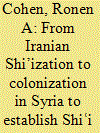

|
|
|
|
|
| Summary/Abstract |
In recent years, we have been witnessing the Islamic Republic of Iran’s process of Shi’ization in Syria and Iraq which has been labelled Al-tabshir al-shii or tashayu by prominent Arab and Muslim clerics. These include Yusuf al-Qaradhawi and Wahbe al- Zahili, a prominent Syrian Sunni cleric who saw this expansion as an aggression that ‘must be stopped’. In 2005 Abdallah II, the king of the Hashemite Kingdom, warned that the ‘Shi’ite Crescent’ circling Jordan from Khorasan in Iran all the way to Lebanon was expanding. The terms Al-tabshir al-Shii or tashayu describe this Shi’ization not only as a religious process but also as a process with geopolitical intentions – that is as an expansion of Shiʿi influence into lands, territories, and states. The main argument of this article is that Iran, with much help from the Syrian regime and Russia turning a blind eye, has been using the methods of colonization to settle Shi’ites in non-Shi’ite territories. Iran’s clear goal is to build a continuous land link between Iran, Iraq and Syria that will extend straight into the mainland of Lebanon.
|
|
|
|
|
|
|
|
|
|
|
|
|
|
|
|
| 4 |
ID:
162528
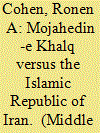

|
|
|
| 5 |
ID:
186155


|
|
|
|
|
| Summary/Abstract |
During the Iran-Iraq war the Mojahedin-e Khalq Organization (MeK or MKO) with its own army, the National Liberation Army of Iran (NLAI), fought side by side with Iraq’s leader. The organization, which showed determination, belief in its goals and unity and achieved several successes in the battlefield had a main, but not final, goal which was to cause the exhausted Iranian Army to collapse − so that the NLAI could then conquer Iran and replace the ‘corrupt regime’ of the Ayatollahs. By providing an understanding of how an ethos can be created, this article describes how an oppositional group’s narrative can transport it from its wishful thinking about winning a battle of the few against the many (which was objectively deemed to be impossible) to the bitter, actual result of total defeat. The article shows how the Mojahedin, by unapologetically siding with Saddam, fought against all odds with the sole result being the creation of a mythos-ethos which would replace that of ex-patriot nationalism. The Mojahedin’s defeat would ultimately translate into a new national-religious ethos in which the Imam Hossein’s fight in Karbala would be commemorated as fighting for the ‘real Islam’.
|
|
|
|
|
|
|
|
|
|
|
|
|
|
|
|
| 6 |
ID:
188440
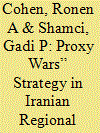

|
|
|
|
|
| Summary/Abstract |
The Islamic Republic of Iran’s efforts to export its revolution in the Middle East is quite old news. The largest regional conventional war in recent history was the Iran-Iraq War (1980–1988), which not only sharpened the historical enmities and hostilities between Arab-Sunnis and Persian-Shiʿi but also revealed Iran’s new foreign policy activism among the other Shiʿi communities in the Middle East – but not only them. This article argues that, after having failed to establish a pro-Iranian government in Iraq, Iran’s regional foreign policy, especially in the matters of managing its proxies and allies in its efforts to build a functional territorial corridor between Iran and Lebanon via Iraq and Syria, views the Syrian geographical region as the last important fortress it needs to complete this strategy. Even though Iran’s economic problems are acute because of decades of sanctions and isolation, Iran still invests billions of dollars in order to safeguard this bastion. The central argument of this work is that the tactical success that the proxies are presently providing for Iran and Syria has been limited to the very specific goal of preserving the Syrian regime since this is what has been enabling Iran to expand its regional stronghold. In terms of this being an effective long-term strategy, however, and despite Iran’s insistence that a proxy war is necessary, such a war benefits its rivals as well. This is because the strategy leads to Iran isolating itself even more in the region and to a loss of its territories of influence.
|
|
|
|
|
|
|
|
|
|
|
|
|
|
|
|
| 7 |
ID:
188972
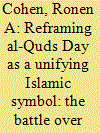

|
|
|
|
|
| Summary/Abstract |
Since 1980, on the last Friday of Ramadhan, millions of Muslims all over the world have held parades to celebrate Jerusalem Day—al-Quds Day—to symbolically strengthen the Palestinian people in their struggle against Israel. It was established by Ayatollah Khomeini, who saw himself as the potential leader of the Muslim world, and Iran proclaimed it to be a national day on a par with other national and religious days and events such as Nowruz, A’shuraa, Ramadhan. This article explores the legitimacy of the status of al-Quds Day for Arab and Muslim countries and its change over time from being enthusiastically celebrated within the Arab world to becoming a marginal event that many Arab and Muslim states have been trying to ignore. The article’s main argument is that although al-Quds Day is still considered to have symbolic value for Islam and unification, the use made of it to further Iranian political interests seems to have diminished its legitimacy and reputation among non-Shiite communities in the Middle East.
|
|
|
|
|
|
|
|
|
|
|
|
|
|
|
|
| 8 |
ID:
174832
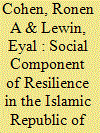

|
|
|
|
|
| Summary/Abstract |
This article examines the social components of national resilience as the source of the Islamic Republic of Iran’s ability to cope with possibly lethal blows and economic setbacks through four stages: (I) an account of the 1980–1988 Iran–Iraq War and the surprising outcome that left Iran undefeated, (II) a review of several theories that can aid us to analyze Iran’s national resilience ability, (III) an analysis of Iran’s wartime survival using the abovementioned theoretical infrastructure, (IV) a concise review of current issues in Iranian society which concludes with an evaluation of the state of Iran’s resilience regarding attacks on their nuclear program and its ramifications.
|
|
|
|
|
|
|
|
|
|
|
|
|
|
|
|
| 9 |
ID:
124966
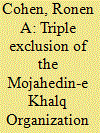

|
|
|
|
|
| Publication |
2013.
|
| Summary/Abstract |
While dealing with the human rights issue, the Mojahedin-e Khalq Organization (MKO), which used to be the main opposition group that fought the Islamic Republic of Iran (IRI), did not realize that this sensitive struggle would cost it a 'triple exclusion'. The MKO wished to use international agencies and diplomatic bodies, such as the European Union, the European Parliament, the UN and others, in order to raise the issue of human rights violations in Iran. In general, the aim was to topple the IRI by putting pressure on it through international sanctions and by gathering diplomatic support to replace the IRI with a democratic MKO government. The use of the human rights issue as a tool to gain support resulted in the opposite of what they wished. They became discriminated against by the IRI and excluded from the Iranian and international political spheres.
|
|
|
|
|
|
|
|
|
|
|
|
|
|
|
|
|
|
|
|
|